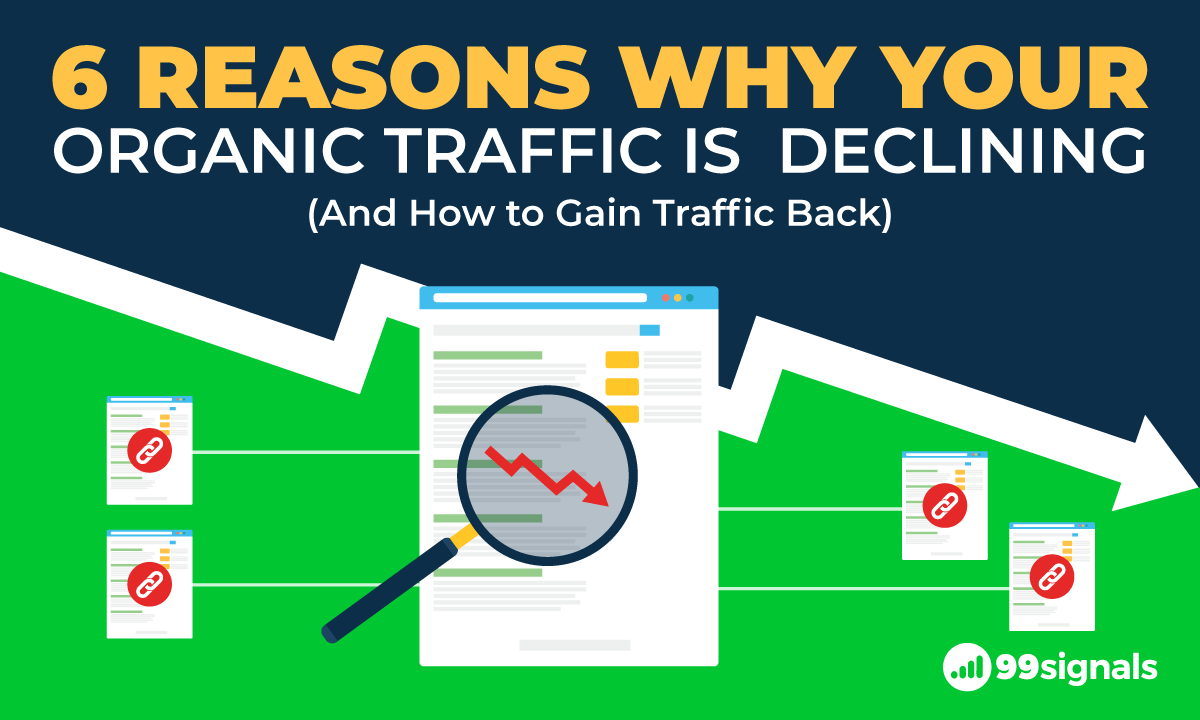 Maintaining, improving, and keeping track of your website's organic traffic are vital tasks for us modern day marketers. After all, organic search results are still the No.1 place consumers head when researching a purchase. And, according to Search Engine Land, organic sources are still more effective (and reliable) than pay-per-click and social media for delivering relevant traffic.
Maintaining, improving, and keeping track of your website's organic traffic are vital tasks for us modern day marketers. After all, organic search results are still the No.1 place consumers head when researching a purchase. And, according to Search Engine Land, organic sources are still more effective (and reliable) than pay-per-click and social media for delivering relevant traffic.
There's no doubt about it: organic search plays a crucial role in improving business sales, revenue, and profits. But what happens if you notice your website's organic traffic taking a nosedive?
Once you've gotten over the initial shock, it's time to face the facts and do something about it.
The first step? Find out the reason for the decline.
Of course, there could be several possible reasons behind the drop in organic traffic, but here are 6 of the most likely causes:
Table of Contents
1. Your website was penalized
If your website is brimming with thin content, poor quality, and duplicate content, your website may be slapped with a Panda Penalty. On the other hand, if you've been aggressive in building backlinks, or have earned links through dubious means, you could be handed a Penguin penalty.
Other possible causes of penalties include damaging SEO practices like keyword stuffing, duplicate content, and linking to a website in a different language . A careful analysis of Google Analytics and Search Console data can give you a clearer idea of which kind of penalty you may be dealing with.
To overcome such penalties, you have to find ways to make the site compliant again. Once you have taken the necessary steps, you can file for a reconsideration request.
Of course, you also have to stop doing the things that got your website penalized in the first place. This means avoiding building too many links to your homepage and posting thin and duplicate content on your website.
2. Google AdWords has crowded you out
There will be times that you think organic traffic is down, when in reality, it just moved. If your organic traffic has been going down but you your rankings have remained stable, you should search your keywords on Google and see if paid ads (or rich answers) are stealing some of your traffic.
In this case, the way to get your traffic back is to invest in Google Ads.
3. Recent website redesign or shift to a new server
If your website underwent an overhaul, organic traffic may be affected. The same thing can also happen if you moved to a new server which can cause different issues such as slow loading time, poor user experience, and too much downtime.
It is therefore important that after a redesign or move to a different server, you check for common mistakes such as redirects and missing pages. It may also be time for you to get SEO going again since putting SEO on hold while changes are made can also adversely affect your website's traffic.
4. Incorrect redirects
Failing to redirect old pages to the new, correct ones will have a negative impact on your organic traffic. Google has never been fond of temporary 302 or 307 redirects and slow meta refreshes. To find out if your website is housing any faulty redirects or redirect loops that might be causing problems, use the Link Redirect Trace extension to check your site and make the necessary changes immediately.
5. You don't have a mobile-friendly website
More and more people are using their smartphones for online search. And if your website is not mobile friendly, Google is more likely to serve another site that is easily accessible. This, in turn, will have a negative impact on your rankings and website traffic.
To check if your website is mobile friendly use the Google Mobile Friendly Test.
Needless to say, if your website fails you need to do something about it.
6. Incorrect Google Analytics settings
This may sound so simple but it happens. A decline in organic traffic can be caused by a tagging problem or setting up your parameters improperly. In this instance, Google Analytics will mistakenly show some decline in traffic when in truth, the traffic may not have declined at all.
To check the cause, view the traffic channels and site content reports in Google Analytics to determine whether you have a webpage or traffic source issue. If you notice that certain pages have dropped in traffic, use Google Tag Assistant to ensure the analytics code is installed correctly.
Conclusion
Seeing a drop in organic traffic can easily send anyone into panic mode. However, there are instances wherein the underlying cause is simple and can be remedied with quick fixes.
But in cases wherein you cannot pinpoint the underlying cause behind the drop in organic traffic or if you do not know how to effectively deal with the main cause of the problem, you should consider getting help from organic search experts.










Wow I never thought that inputting the wrong Google Analytics settings can have an impact on the decrease on your traffic..thanks for pointing that out..will be careful next time.
Great points! I also haven't heard about GA settings which can impact on the traffic. I will take care about those settings in GA